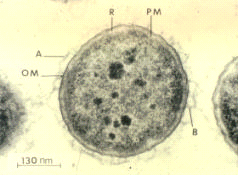
Aeromonas is a genus of Gram-negative, facultative anaerobic, rod-shaped bacteria that morphologically resemble members of the family Enterobacteriaceae. Most of the 14 described species have been associated with human diseases. The most important pathogens are A. hydrophila, A. caviae, and A. veronii biovar sobria. The organisms are ubiquitous in fresh and brackish water.
Aeromonas veronii is a Gram-negative, rod-shaped bacterium found in fresh water and in association with animals. It can be a pathogen of humans and a beneficial symbiont of leeches. In humans A. veronii can cause diseases ranging from wound infections and diarrhea to sepsis in immunocompromised patients. Humans treated with medicinal leeches after vascular surgery can be at risk for infection from A. veronii and are commonly placed on prophylactic antibiotics. Most commonly ciprofloxacin is used but there have been reports of resistant strains leading to infection. In leeches, this bacterium is thought to function in the digestion of blood, provision of nutrients, or preventing other bacteria from growing.

Aeromonas hydrophila is a heterotrophic, Gram-negative, rod-shaped bacterium mainly found in areas with a warm climate. This bacterium can be found in fresh or brackish water. It can survive in aerobic and anaerobic environments, and can digest materials such as gelatin and hemoglobin. A. hydrophila was isolated from humans and animals in the 1950s. It is the best known of the species of Aeromonas. It is resistant to most common antibiotics and cold temperatures and is oxidase- and indole-positive. Aeromonas hydrophila also has a symbiotic relationship as gut flora inside of certain leeches, such as Hirudo medicinalis.

Aeromonas salmonicida is a pathogenic bacterium that severely impacts salmonid populations and other species. It was first discovered in a Bavarian brown trout hatchery by Emmerich and Weibel in 1894. Aeromonas salmonicida's ability to infect a variety of hosts, multiply, and adapt, make it a prime virulent bacterium. A. salmonicida is an etiological agent for furunculosis, a disease that causes sepsis, haemorrhages, muscle lesions, inflammation of the lower intestine, spleen enlargement, and death in freshwater fish populations. It is found worldwide with the exception of South America. The major route of contamination is poor water quality; however, it can also be associated stress factors such as overcrowding, high temperatures, and trauma. Spawning and smolting fish are prime victims of furunculosis due to their immunocompromised state of being.
Aeromonas allosaccharophila is a Gram-negative, catalase-positive, motile bacterium from the genus Aeromonas which was isolated from ill elvers in Valencia, Spain.
Aeromonas australiensis is a Gram-negative, anaerobic bacterium from the genus Aeromonas isolated from an irrigation water system in Western Australia.
Aeromonas bivalvium is a Gram-negative, oxidase- and catalase-positive, motile bacterium with a polar flagellum of the genus Aeromonas isolated from bivalve molluscs.
Aeromonas diversa is a Gram-negative, facultative anaerobic bacterium of the genus Aeromonas isolated from the leg wound of a patient in New Orleans.
Aeromonas encheleia is a Gram-negative, motile bacterium of the genus Aeromonas isolated from European eels in Valencia, Spain.
Aeromonas eucrenophila is a Gram-negative bacterium of the genus Aeromonas isolated from fresh water and infected fish. A. eucrenophila is a pathogen of fish, and it causes diarrhoea in humans.
Aeromonas fluvialis is a Gram-negative, oxidase- and catalase-positive, facultatively anaerobic, non-spore-forming bacterium of the genus Aeromonas isolated from water from the Muga River in Girona in northeastern Spain.
Aeromonas jandaei is a Gram-negative bacterium of the genus Aeromonas isolated from human feces in Oregon.
Aeromonas molluscorum is a Gram-negative, oxidase- and catalase-positive, motile bacterium with a polar flagellum of the genus Aeromonas which was isolated from bivalve molluscs.
Aeromonas popoffii is a Gram-negative bacterium of the genus Aeromonas isolated from drinking water production plants and reservoirs in Oelegem, Belgium, and in Scotland.
Aeromonas rivuli is a Gram-negative, oxidase- and catalase-positive, non-spore-forming bacterium with a polar flagellum of the genus Aeromonas isolated from Westerhöfer Bach in Harz in Germany.
Aeromonas sanarellii is a Gram-negative, oxidase- and catalase-positive, non-spore-forming bacterium of the genus Aeromonas isolated from wounds of patients in a hospital in Taiwan.
Aeromonas simiae is a Gram-negative, oxidase- and catalase-positive motile bacterium of the genus Aeromonas, with a polar flagellum, isolated from the faeces of a healthy monkey.
Aeromonas taiwanensis is a Gram-negative, oxidase- and catalase-positive, non-spore-forming, motile bacterium of the genus Aeromonas isolated from wounds of patients in Taiwan.
Aeromonas tecta is a Gram-negative bacterium of the genus Aeromonas isolated from stool of a child with diarrhoea, a healthy patient, and environmental sources.
Chryseobacterium piscicola is a Gram-negative, rod-shaped and non-motil bacteria from the genus Chryseobacterium which has been isolated from the salmon Salmo salar from the Los Lagos Region in Chile.

